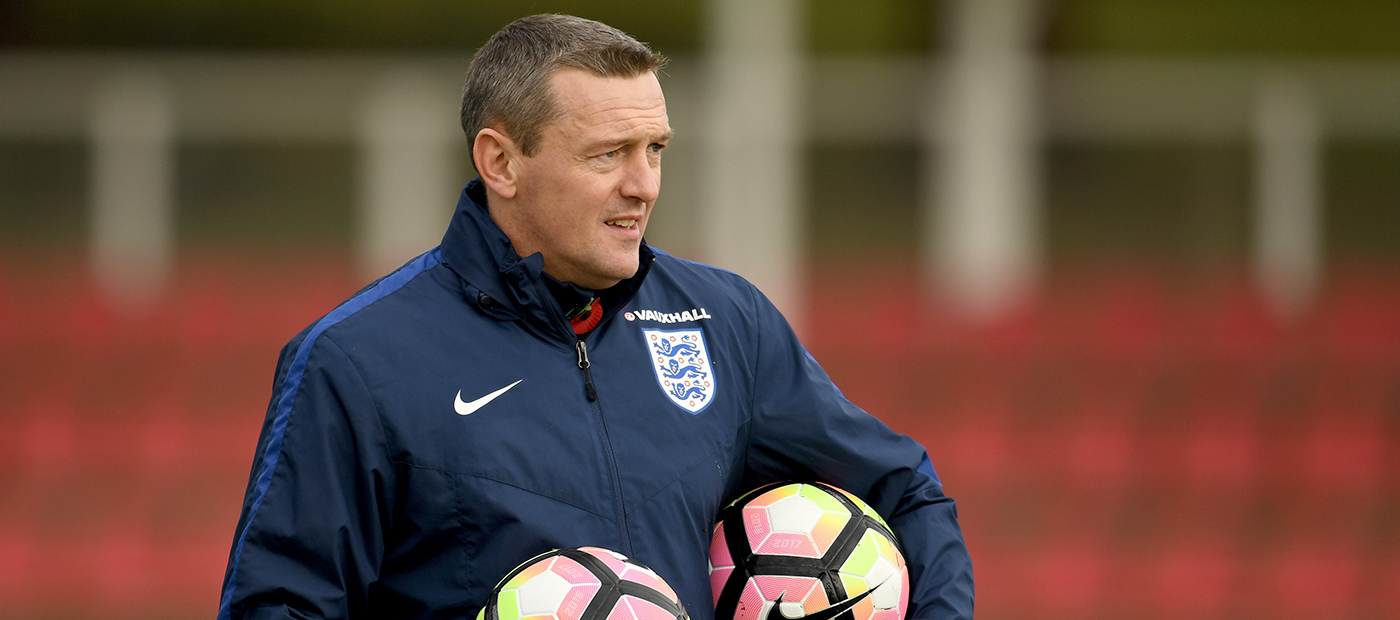England insight

How England youth teams use a 'what if' plan on matchday
- The Boot Room
- 21 December 2018
Aidy Boothroyd, England U21 head coach, tells Peter Glynn how England youth teams aim to prepare for all scenarios ahead of international fixtures.
Boothroyd is a firm believer in a ‘what if’ plan on match day. Every eventuality and scenario is prepared for, and a plan B,C and D practised and ready. However, there are some things that even the most robust plan can’t foresee.“The game that sticks in my mind the most was a trip to Macedonia for an U19 UEFA qualifying round. When we got there it rained and it rained and rained. They were the worst conditions I’ve ever seen – large puddles all over the pitch,” explains Boothroyd, who joined the national set-up in 2014 and has worked with the U19s and U20s.
“We had a game plan for all aspects of our play going into that tournament and we’d planned to play our passing game but when we got there we just couldn’t do any of it.”
The 46-year-old says that quick thinking and adapting to the circumstances proved to be the making of his best ever England pre-match team talk.
“Before the game I went onto the pitch with my notepad and noted down where all the water was and then went back into the changing rooms and put it up on the flipchart. We then had a chat with the players about the areas of the pitch they could play in and the areas where they would have to think differently.”

Boothroyd explains the diagram prompted an innovative discussion based on the players’ previous experiences of dealing with difficult conditions. It clearly worked. England won the game 2-0.
“It was very, very, tough game but we fully adapted to it – the players were able to think back to when they were kids and when they played in puddles and boggy pitches and came up with solutions to help them adapt,” adds Boothroyd.
Extreme weather conditions aside, the U21 boss prefers to have players and staff prepared for all eventualities as they approach match day.
“We always go into a game with a plan, and part of that is the ‘what if’ plan. You want to go into a game with the feeling that whatever could happen in the game you can adapt to it.”
The former Watford, Colchester, Coventry and Northampton manager explains that the players will practise responses to different ‘what if’ scenarios in the run up to the game. Acting out the game from the point of the opposition is a crucial part of preparation.
“I think it’s really important to second guess the opposition and ask: ‘how would I play against our team?’ That’s what we try and do. All the coaches involved in the England set-up are discussing these things before a game,” explains Boothroyd.
It’s their responsibility to ensure we’re working effectively from the bench to the pitch
It’s one thing to practise going down to 10 men or defending a lead on the training pitch, another dealing with unexpected issues in the heat of action.
Boothroyd explains that managing the emotion of the occasion allows both coaches and players to think clearly.
“When things do go awry and not how you want them to, it’s really important to keep a calm head and the [‘what if’] plan gives you a bit of a crutch with that."
For all the desire to control the game narrative, invariably decision-making is needed during the game. Boothroyd aims for “composure above the occasion”.
“Having a calm approach and being able to see what it is that is going to make the difference comes from experience. If you’ve got twenty things in front of you you’ve got to pick one or two that are going to make a difference,” he explains.
On match day, the U21 head coach works closely with his assistant coaches to gather different perspectives on the action – one assistant focusing on in possession, another on out of possession.
“Most coaches aren’t lucky enough to be working with specialist coaches for in and out of possession, but even if it’s just you and one other, then two different points of view makes the difference from both of you just looking at it like it’s a film,” he explains.
However, the onus isn’t solely on the coaching staff to identify and solve any in-game changes to the plan. The players, as the main actors, are central to the process.
“For three or four of the players - as captains and as a leadership group – it’s their responsibility to ensure we’re working effectively from the bench to the pitch and from the pitch to the bench.
“If the players come over to the bench to grab a drink there will be certain players who come over and say ‘what do you think’. We might just add small details for them to relay to the group.”
First published in The Boot Room magazine in March 2017.


























